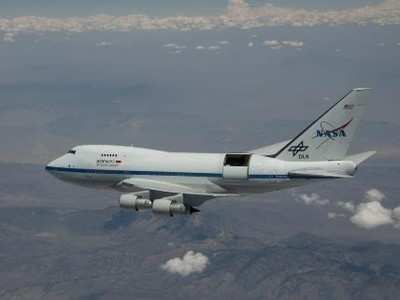Sun, Apr 22, 2012
Hi-Res Airborne Wideband Camera To Fly On SOFIA Aircraft
NASA has selected a science instrument upgrade to the Stratospheric Observatory for Infrared Astronomy (SOFIA) airborne observatory. The instrument, the High-resolution Airborne Wideband Camera (HAWC), will provide a sensitive, versatile and reliable imaging capability to the SOFIA user community. The upgrade involves two proposals that will allow the observatory to measure the structure and strength of magnetic fields in diverse objects throughout the universe, such as star-forming clouds and galaxies. This will help astronomers better understand how stars, planets and galaxies form and evolve.

SOFIA is a highly modified Boeing 747SP aircraft that carries a telescope with a 100-inch (2.5-meter) diameter reflecting mirror that conducts astronomy research not possible with ground-based telescopes. By operating in the stratosphere at altitudes up to 45,000 feet, SOFIA can make observations above the water vapor in Earth's lower atmosphere. "SOFIA has the ability to become a world-class airborne observatory that complements the Hubble, Spitzer and Herschel space telescopes," said John Grunsfeld, NASA's Science Mission Directorate associate administrator. "This upgrade will greatly broaden SOFIA's capabilities."
Last August, the agency released an Announcement of Opportunity for SOFIA second-generation instrument investigations and received 11 proposals. The selected proposals were judged to have the best science value and feasible development plans.
The selected proposals are:
- The High-resolution Airborne Wideband Camera Polarization (HAWC-Pol), Charles Dowell, principal investigator, NASA's Jet Propulsion Laboratory, Pasadena, CA. This investigation upgrades the HAWC instrument to include the capability to make polarimetric observations at far-infrared wavelengths. The investigation's main goals are to measure the magnetic field in the interstellar medium, star forming regions and the center of the Milky Way.
- HAWC++, Johannes Staguhn, Johns Hopkins University, Baltimore, MD. This investigation will provide a sensitive, large-format detector array to the HAWC-Pol investigation, increasing its observing efficiency and providing a broader range of targets.
(Image provided by NASA)
More News
“Setting eight speed records this quickly following its August entry into service is a powerful testament to the tremendous capabilities of this aircraft. We are already seei>[...]
On-Course Indication An indication on an instrument, which provides the pilot a visual means of determining that the aircraft is located on the centerline of a given navigational t>[...]
Aero Linx: WW1 Aeroplanes, Inc. WORLD WAR 1 AEROPLANES was founded by Leo Opdycke in 1961 and incorporated as a federally recognized 501 (c) (3) not-for-profit corporation in 1979,>[...]
Pilot Reported That He Purchased The Airplane Earlier That Day Analysis: The pilot reported that he purchased the airplane earlier that day and completed a condition inspection tha>[...]
Also: Abu Dhabi’s 1st Vertiport Network, Anduril-EDGE Partner, Vertical Permit/eVTOL Regs Sierra Space’s Dream Chaser spaceplane has cleared another round of pre-flight>[...]
 Aero-News: Quote of the Day (11.18.25)
Aero-News: Quote of the Day (11.18.25) ANN's Daily Aero-Term (11.18.25): On-Course Indication
ANN's Daily Aero-Term (11.18.25): On-Course Indication ANN's Daily Aero-Linx (11.18.25)
ANN's Daily Aero-Linx (11.18.25) NTSB Final Report: Shoemaker Ronald R Pazmany PL-2
NTSB Final Report: Shoemaker Ronald R Pazmany PL-2 Airborne-NextGen 11.18.25: Dream Chaser Preps, Joby eTurbine, UAE Flt Test
Airborne-NextGen 11.18.25: Dream Chaser Preps, Joby eTurbine, UAE Flt Test



